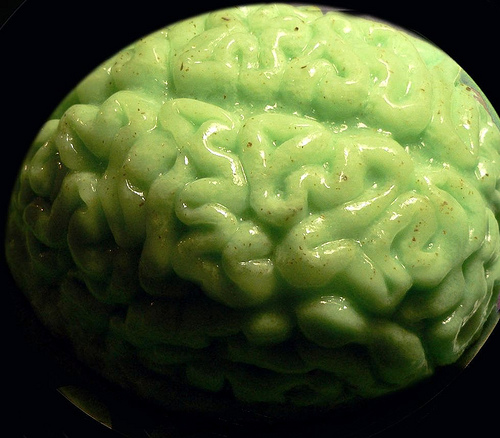
Image via hurleygurley [Flickr] (BTW, if you want to make your own brain Jell-O, get the mold at the Neatoshop.)
Our brains are incredibly complex organs that allow us to comprehend both our surroundings and abstract concepts. Unfortunately, because our minds have to process so much information at once in order to help us understand things, they can also be easily tricked. Here are a number of ways your brain not be as reliable as you like to think.
Memories
We like to think that our memories work as photographs that preserve our pasts, but the reality is that memories change all the time and can be manipulated to change even faster.

Image via wallyg [Flickr]
Do you recall seeing the video of the first plane hit the World Trade Center on September 11? 73% of people remember seeing the video on that fateful day, but the truth is that the footage of the first plane wasn’t released until the next day. The problem is, according to neuroscientist Karim Nader, that every time you remember something, you change it just a little in your mind. Thus, the more we recall a memory, the more we forget the actual details of the event. In fact, if you make up a lie about something and tell it to yourself often enough, your brain will actually start to remember the fib as the cold hard truth.
If that wasn’t bad enough, other people can manipulate your memories just as easily. Remember when the concept of repressed memories came out a few decades ago and everyone started to believe it as absolute truth? As it turns out, repressed memories can be easily implanted in your mind through the power of suggestion. Researcher Elizabeth Loftus told study participants that she was conducting research on childhood memories. She gave them four accounts of stories from their childhood that were written by the relatives. One of the four accounts was a fictional story about being lost in the mall. Loftus then asked them questions about this incident and over a quarter of the volunteers recalled this imaginary event, citing incredible details about the incident.
After learning about these two facts, it’s not entirely surprising that repetition of something can lead to our acceptance of the statement as a truth. It’s called the Illusion-of-Truth effect and it means that we start to believe things are true, despite evidence to the contrary, if we just hear about it enough. It’s sort of our brain’s way of saying, “well if everyone else believes this, then I should too.”
What’s worse though is that when someone has firmly accepted something this way, it’s nearly impossible to prove the truth to them. Think about a cult that says the world will end on a certain date. When the time comes and goes, the cult members don’t realize they’ve been had and move on with their lives, they start rationalizing it, saying that they changed god’s mind somehow. In many cases, being confronted with the truth will only make the mislead person believe his or her convictions even more strongly.

It doesn’t even take manipulation from another person to alter your memories. Your brain can be tricked with a Photoshopped image just as easily. Ms. Loftus, from the repressed memories study, also experimented with falsified images including the famed picture from the Tiananmen Square protest. People who saw the manipulated images were far more likely to remember the events in a different manner than those who didn’t see the altered pictures. By the way, if you realized the crowd in the image above was added after the photo was taken, you’re in the minority.
Concentration
Our brain’s concentration can also lead to some strange problems with cognition. For example, watch the video below and count how many times the white team passes the ball.
Video link.
Did you notice the gorilla? Over 50% of people watching the white team don’t notice the fact that a man in a gorilla suit walks through the court. This phenomenon is known as selective inattentiveness and it makes sense from an evolutionary perspective. When you are hunting or being hunted, you don’t want to be distracted by every little thing going on around you. Sometimes though, this inattentiveness can be a problem. If the players in white were prey and the gorilla was a predator, half of all viewers would be an easy target for the hungry beast.
Interestingly, if we are told not to focus on something after it is brought to our attention, we usually can’t get the image out of our minds. Watch the video again and try to ignore the gorilla. Your eye and your mind will almost certainly keep going back to it.

Image via Marcus Vegas [Flickr]
Similarly, if you try not to think of a white bear, your mind will keep veering back to the white bear. If you’ve ever had a crush that just wouldn’t get out of your head even after you made a conscious effort to stop thinking about him or her, it’s the same problem; the conscious effort makes you focus on the one thing you aren’t supposed to think about. This can even lead to an obsession, which is why so many stalkers know very well that they shouldn’t be so focused on the person at hand.
Senses

Image via Sean Dreilinger [Flickr]
Did you know today is National French fry day? I don’t know about you, but where I live, everyone is frying them up. I can smell French fries all over the place, even in my house. Do you smell them? If so, then I have some bad news; it’s not National French fry day and unless someone’s in your kitchen making fries right this second, your mind is probably playing tricks on you.
Over 100 years ago, Professor Edwin Slosson proved that suggestion is a major part of our sense of smell. He poured distilled water on a cotton ball and told his class that he just poured a sample of a highly aromatic chemical. He then asked them to raise their hands when they could smell it. Within 15 seconds, the majority of the front row had their hands in the air and within 45 seconds, three-quarters of the class was raising their hands.
If you read the rest of this article saying “fine, my memories and my concentration can be manipulated, but my basic observations are more reliable,” then you’re wrong. Sensory manipulation is so easy that even professionals can be duped.
 Image via digimist [Flickr]
Image via digimist [Flickr]
A 1998 study by Frederic Brochet asked 54 professional wine tasters to try some wines and write down their opinions. He asked the specialists to taste two white wines and two red wines. The first set of red and white wines were different, but the second set was the same white wine with some red food coloring added, presented as “red wine.” The tasters used completely different adjectives to describe the colored wine as its uncolored equivalent. Their notes on the white wine included things like “dry, apricot, lemon, honey, and straw,” while the red wine notes included words like “deep, cherry, raspberry, spice and black currant.”
He later tried serving the specialists another wine, telling them it was a common table wine for the first sampling and for the second sampling, he told them it was an expensive vintage. The tasters loathed the first sample, calling it “simple, unbalanced and volatile.” When it was presented as a premium wine, they called it “complex, balanced, flavorsome and excellent. While it would be easy to say that this was a good way to prove that wine tasters are full of it, the study actually goes a lot deeper into how we give foods a perception prior to trying them and how this can affect our sense of taste.
The human mind is a complex and wondrous place, but the more you accept its ability to make mistakes, the fewer manipulations you will be subject to. And next time you’re arguing with someone about politics, just remember, whoever is wrong will never allow their mind to accept the truth, even when it is presented conclusively, so there’s really no point to the discussion.
Sources: Elephants on Acid, Smithsonian Mag, Boston Globe, Wiley InterScience, Wikipedia, Cracked
"

Nenhum comentário:
Postar um comentário